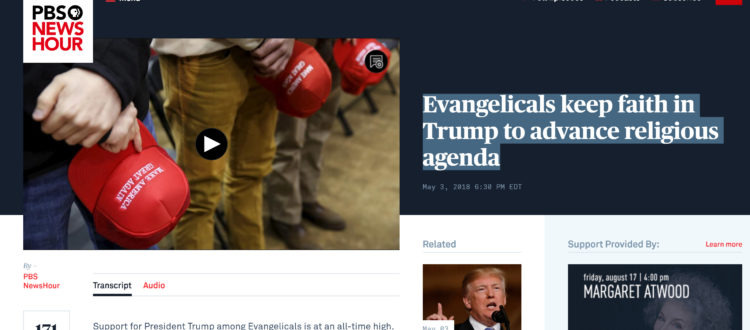Are Christians Being Disadvantaged?
A segment on PBS NewsHour, “Evangelicals Keep Faith in Trump to Advance Religious Agenda,” included an interview with Rev. Samuel Rodriguez, head of the National Hispanic Christian Leadership Conference. He speaks to why Evangelical Christians support Donald Trump. In two words, he says it is “Public policy.” He goes on to say this:
“Evangelicals experienced or felt that, in the past number of years, the past 10 years, issues of religious liberty, issues of advancing their Judeo-Christian value systems stood in a de facto and [de jure] manner, for that fact, threatened. Sisters of the Poor, Hobby Lobby, Supreme Court cases that to evangelicals infringed their ability to advance the Gospel of Jesus. So, all of a sudden, we have President Donald Trump, and the public policy initiatives as it pertains to faith is much more favorable to the evangelical community indeed.”
Rev. Rodriguez has every right to say what he says here, as matters of both free speech and religious freedom. And the purpose of our initiative on this page is in fact to defend those rights and to assure that the rights of Evangelicals to their beliefs are equal to the rights of people of other religions and beliefs. That is precisely as our Constitution holds. However, he is arguing that those Christian beliefs are somehow being disadvantaged — “both de facto and de jure.” He then cites his evidence of “Sisters of the Poor …., etc.”
He seems to be making two mistakes that we see very often from the conservative Christian Evangelical movement:
- Re: his ‘de jure’ assertion: When the courts have held that Sisters of the Poor and Hobby Lobby were in the wrong, it was because they were imposing their religious views on others not because there was anti-Christian impetus. It is wrong for any group serving the public, or with employees who of course have the rights of citizens, to impose their views on them.
Re: ‘de facto’: If some businesses that serve the public have opted to use the term “Happy Holidays” during the Christmas (and Hanukkah, Festivus, Solstice, Mawlid) season, it is because they recognize that not all of their customers are Christian and they are respecting that diversity. It has nothing to do with any “War on Christmas,” and certainly not anything originating with the government or from the power of those of non-Christian beliefs over the government. Other groups who support this broader terminology are striving for inclusion. “Merry Christmas” is not experienced by everyone as inclusive. Pretty simple.So, Christians are in no way being disadvantaged, limited, or being discrimated against by law or otherwise. They ARE however being held to a status of equality with other beliefs. Since they are used to being in the majority and now hear more voices of secularists, Muslims, etc., in the public square than they used to, that might LOOK like an increasing disadvantage. They are no longer virtually the only voice. (The well-known concept of “relative deprivation” can partly refer to this.) Elevating others to equality can look like you are losing out.
- When the good Reverend refers to being limited in “advancing their Judeo-Christian value systems,” he seems to be basing that on a classic conflation that comes often from conservative Christian sources. This conflation is reflected in their common assertion that “we are a Christian country.” Given the vagueness of what the word “country” can refer to, they are not entirely wrong. We are in truth a land where the majority is Christian — and in fact Protestant historically. But, they are wrong if they are try to slip over into saying that our nation-state was constituted as Christian, or “Judeo-Christian.” On that critical and central point, we are NOT a Christian country. It is interesting, however, how often conservative Christians will fall back on saying how often “God” is mentioned in our “founding documents,” a slippery generalization that lumps together a few documents where God is mentioned — none of which is the blueprint for the structure of governance, the Constitution.

